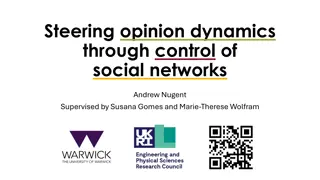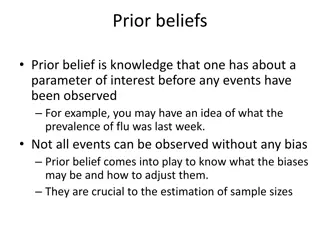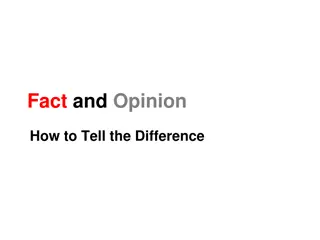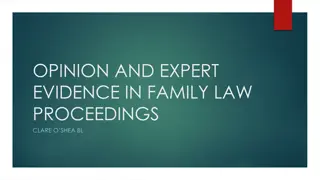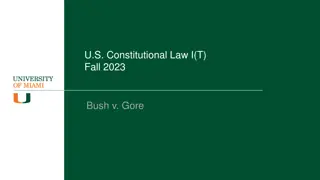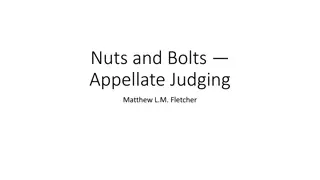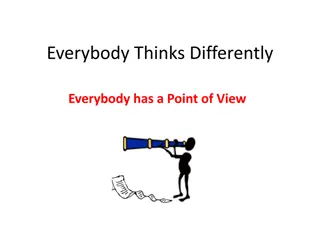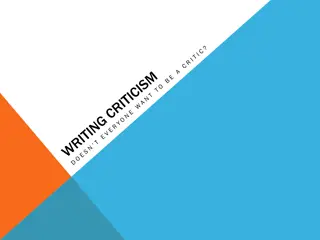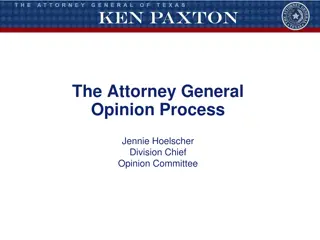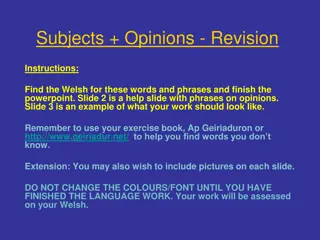
The Difference Between Facts and Opinions
Learn how to distinguish facts from opinions, the importance of verifying information, and how interpretations play a role in assigning meaning to facts. Discover the nuances of truth and the implications of mixing opinions with facts.
Download Presentation

Please find below an Image/Link to download the presentation.
The content on the website is provided AS IS for your information and personal use only. It may not be sold, licensed, or shared on other websites without obtaining consent from the author. If you encounter any issues during the download, it is possible that the publisher has removed the file from their server.
You are allowed to download the files provided on this website for personal or commercial use, subject to the condition that they are used lawfully. All files are the property of their respective owners.
The content on the website is provided AS IS for your information and personal use only. It may not be sold, licensed, or shared on other websites without obtaining consent from the author.
E N D
Presentation Transcript
Just the Facts Identifying Fact from Opinion
Lesson Overview and Goals identify the difference between facts understand how the concept of "truth know when something moves from the realm of factual to opinion apply the different types of opinions types of opinions to their appropriate settings facts and factual statements factual statements truth" applies to what we know about facts opinion- -based statements based statements
Test Your Knowledge! Answer questions 1-2 of the QUIZ: Facts vs. Opinions
What are facts? Truth is the realm of the philosopher; Facts are the realm of the grammarian Truth is the realm of the philosopher; Facts are the realm of the grammarian An event, statement, or experience that is true Are verifiable / correspond with experience An occurrence in the real world Except statements of fact can be wrong / false. Intent vs. Truth Acknowledged, not created or discovered But also on the page! Cannot be disputed with logic Even if they only happen once Proof is preferred
Facts vs. Factual Statements Water boils at 100 degrees. Water boils at 212 degrees Fahrenheit.
What facts are NOT Opinions Interpret ations 1. 1. Opinions Opinions are judgements or beliefs about an experience 2. 2. Interpretations Interpretations are assumptions made about experiences 3. 3. Analysis Analysis is a process of examining the structures and elements of our experiences 4. 4. Truth Truth is much trickier. Analysis Truth
Facts need Context Facts by themselves aren t very helpful Facts need to be interpreted to have value Interpretation involves formal logic, critical thinking, and an understanding of truth This is where many issues of fact/inference/opinion come up We give meaning to facts by interpreting their implications and applications
Adding Opinions into the mix
Whats an opinion? Plato distinguished between common belief (doxa) and certain knowledge an opinion has a degree of subjectivity and uncertainty to it certain knowledge is certain because it has proof But opinion comes in 3 varieties: 1. tastes or preferences (reactions to experiences) 2. views about questions that concern most people such as ethics, politics, or faith (applications of facts) 3. views grounded in technical expertise, such as legal or scientific opinions
No, Youre Not Entitled to Your Opinion You are only entitled to what you can argue for Some opinions can be proven wrong Opinions are often used to shelter beliefs that should have been abandoned after seeing new evidence or listening to the factual experiences of others You are entitled to hold hold any opinion you d like, but that doesn t mean those opinions Should be treated as factual reality, unless with sufficient support Should be measure equally against facts
Test Your Knowledge! Answer questions in Parts 2-4
In order to have logical value, opinions should be centered around implications and applications, and supported by fact Then how do we debate anything?!
Adding value to opinions 1. I believe tuna fish is a better lunch than yogurt. 2. In my experience, it rains more in Florida than in Washington. 3. Black holes hold the key to faster than light travel. 4. I believe thoughts and prayers do have value, even if they aren t the only solution. 5. I don t believe it is appropriate to teach children creationism in a contemporary science class. Tuna fish provides nearly double the protein of a standard serving of yogurt, making it a better lunch choice to keep your body fueled throughout the afternoon. Despite tuna s higher protein levels, yogurt has a significantly lower impact of the environment due to the lack of hydrofarming and the rate at which yogurt can be produced. Opting for yogurt instead of tuna at lunch can help create a better world.
Test Your Skills! Answer the final quiz questions




